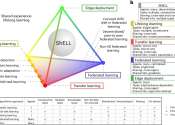Top computer scientists say the future of artificial intelligence is similar to that of Star Trek
Leading computer scientists from around the world have shared their vision for the future of artificial intelligence—and it resembles the capabilities of Star Trek character "The Borg."
Mar 22, 2024
7
643









